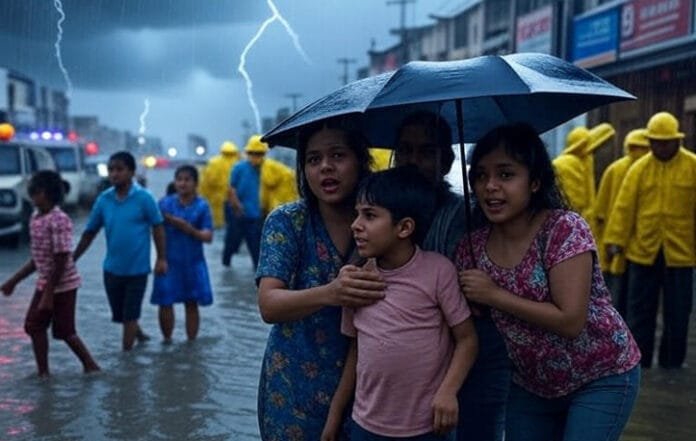The India Meteorological Department (IMD) has sounded an urgent warning across vast parts of the country due to a depression that has developed in the Bay of Bengal. This system, having crossed over the coasts of West Bengal and Bangladesh, is currently triggering widespread heavy to very heavy rainfall in Eastern, Central, and Southern India. In response, red and orange alerts have been issued in numerous districts across several states, urging residents and local authorities to remain on high alert.
Bay of Bengal Depression Sparks Widespread Rainfall
The low-pressure area over the Bay of Bengal has intensified into a depression and is now heading northwest. As it continues to travel inland, it is expected to affect the following regions with intense precipitation:
West Bengal
Odisha
Jharkhand
Chhattisgarh
Vidarbha
Madhya Pradesh
Eastern Rajasthan
Over the next 24 to 72 hours, the system is likely to maintain its strength, bringing moderate to heavy rainfall, and in some areas, extremely heavy downpours, which could lead to flood-like conditions, urban waterlogging, and agricultural disruptions.
Odisha, Jharkhand, Bengal: Red Alerts in Effect
The IMD has issued a red alert for Mayurbhanj and Keonjhar districts in Odisha, warning of extremely heavy rain until July 28. Additionally, an orange alert is in place for ten other districts, including:
Balasore
Bhadrak
Jajpur
Kendrapara
Jagatsinghpur
Cuttack
Angul
Dhenkanal
Sambalpur
Deogarh
In Jharkhand, isolated heavy rainfall has already caused localized flooding, and the situation is expected to worsen with continued rainfall through July 30. West Bengal, particularly Kolkata, Hooghly, Purulia, and Bankura, will also experience intensified showers with strong surface winds.
Madhya Pradesh: Brace for Torrential Showers on July 27–28
The IMD forecasts heavy to very heavy rainfall in central and eastern Madhya Pradesh, especially in districts such as:
Jabalpur
Chhindwara
Betul
Hoshangabad
Seoni
The peak rainfall activity is expected on July 27 and 28, and citizens have been cautioned about flooded low-lying areas, overflowing drains, and potential traffic snarls.
Chhattisgarh and Vidarbha: Persistent Downpour to Continue Till July 30
Chhattisgarh and Vidarbha remain under a consistent rainfall pattern, which is expected to persist through the month’s end. Districts like Raipur, Bilaspur, Bastar, and Durg in Chhattisgarh, and Nagpur, Chandrapur, and Wardha in Vidarbha are facing continuous moderate to heavy rainfall with sporadic very heavy spells.
Mumbai and Maharashtra: Orange Alert Amid Traffic Chaos
On Friday, Mumbai witnessed intense rainfall, which disrupted local train services and caused severe traffic congestion across the city. Waterlogged roads and slow-moving vehicles were reported in:
Andheri
Bandra
Dadar
Kurla
Borivali
The IMD has issued an orange alert for Mumbai, Thane, Raigad, and Palghar, predicting more heavy to very heavy rains in the next 24–48 hours. Mumbaikars are advised to stay indoors unless essential, as administrative advisories remain in effect.
Delhi NCR: Heat and Humidity Followed by Rain Relief
Delhiites battled sweltering conditions on Friday, as hot winds and bright sunlight pushed the mercury up to 36.9°C, with minimum temperatures hovering around 28°C. However, rainfall with thunder and lightning is expected to provide relief on Saturday, especially in areas such as:
Rohini
Narela
Pitampura
Paschim Vihar
Punjabi Bagh
Badli
Mundka
Temperatures are expected to dip slightly, remaining in the 28–35°C range, as monsoon showers return to the capital.
South India: Heavy Rainfall Predicted in Karnataka, Kerala, Telangana
The Southern Peninsula is also bracing for a week-long spell of rainfall, as the monsoon intensifies. The IMD has issued alerts for multiple regions:
Karnataka: Very Heavy Rainfall Expected
Kodagu, Chikkamagaluru, and Udupi are expected to see very heavy rainfall, which could cause landslides in the hilly terrain and flash floods in vulnerable areas.
Kerala: Alerts in Idukki and Wayanad
The red alert issued for Idukki and Wayanad districts indicates exceptionally heavy downpour, with orange alerts in surrounding regions. Continuous rain may impact local transportation and increase the risk of river overflow.
Telangana and Andhra Pradesh
Cities including Hyderabad, Warangal, and Nizamabad in Telangana, and Vishakhapatnam, East Godavari, and Srikakulam in Andhra Pradesh are projected to receive intense rainfall over the coming days.
Eastern and South-Eastern Rajasthan: Rain to Intensify From July 27 Onwards
The effect of the Bay of Bengal system will extend to south-eastern and eastern Rajasthan, particularly from July 27 to July 31. The districts under focus include:
Kota
Baran
Jhalawar
Udaipur
Banswara
These areas may receive very heavy rainfall on July 27, with enhanced rain activity continuing into early August. Meanwhile, western Rajasthan is also on alert for moderate to heavy rainfall, especially in Jodhpur and Barmer.
Uttar Pradesh: Monsoon Rains Bring Respite in Lucknow and Beyond
Lucknow, the capital of Uttar Pradesh, along with other districts such as Kanpur, Gorakhpur, and Varanasi, has been receiving moderate to heavy rainfall, resulting in pleasant weather and much-needed relief from the heatwave.
Rain is forecast to persist across the eastern and central zones of the state, which will help in soil moisture recharge and crop sustainability during the Kharif season.
Precautions and Advisory for Residents
Given the scale and spread of the heavy rainfall, IMD and state authorities have urged citizens to:
Avoid low-lying flood-prone zones
Limit travel unless essential
Stay updated via official IMD bulletins
Keep emergency supplies ready
Charge mobile devices and power banks
Ensure drainage around homes remains unclogged
The National Disaster Response Force (NDRF) teams have been deployed in high-risk zones to provide rapid relief in case of emergencies.
Conclusion: Widespread Monsoon Activity to Dominate Week Ahead
India is currently experiencing a monsoon surge, with heavy rainfall activity enveloping nearly every region — from the eastern coasts to the central plateau, and from the northern plains to the southern peninsula. With red and orange alerts in effect, preparedness and caution remain critical. As always, we advise our readers to follow official advisories, avoid unnecessary risks, and stay tuned for real-time updates as the weather system continues to evolve.
















